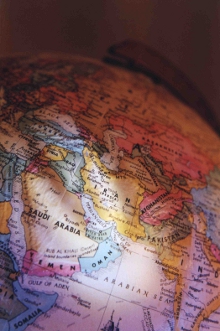A magazine where the digital world meets the real world.
On the web
- Home
- Browse by date
- Browse by topic
- Enter the maze
- Follow our blog
- Follow us on Twitter
- Resources for teachers
- Subscribe
In print
What is cs4fn?
- About us
- Contact us
- Partners
- Privacy and cookies
- Copyright and contributions
- Links to other fun sites
- Complete our questionnaire, give us feedback
Search:
Muslims and Maths
By Zin Elabidin Derfoufi, Undergraduate at Queen Mary University of London

We often hear of famous computer scientists who have helped changed the way we think of computers today. People such as Blaise Pascal, John Louis Von Neumann and most famously, Charles Babbage also known as "the Father of Computing". However, "Every father is the son of a Father" so although the works of people like Charles Babbage were modern in their time and no doubt did shape the future of modern technology, their work built on that of others. So the question arises, who was the grandfather of computing? One of the fundamental aspects of computing is maths. After all, the first ever computer was built to calculate simple maths.
It was under the Islamic Khoulafah (plural for Khalifah [Caliphates]) such as the Omayyads and Al-Ma'mun that the mathematical sciences really advanced and new discoveries were made. Even the Europeans would flock to the East to benefit from the immense contributions made by the Islamic scholars. It was during this time that the Muslims in the Arabian peninsular began to interpret the already existing mathematical sciences from sources like the Greeks and further advanced it beyond the comprehension of any other civilization of the time.
Algebra was one of the most focussed-on subjects. One of the greatest people to contribute to and advance Algebra was Al-Khwarizmi. On becoming a member of Dar Al-Hikmah (the House of Knowledge) in Baghdad in the 800s he made immense advancements to Mathematics, astronomy, astrology, and more. In fact the word Algebra came from the Arabic word Al-Jabr from his book 'Al-Kitab al-mukhtasar fi hisab al-jabr wa'l-muqabalah' ('The Compendious Book on Calculation by Completion and Balancing'). Most algebra we use today for computing is taken from the ideas left in his priceless books. Furthermore, it was he who explained the use of the number zero. It was introduced to the world by previous Muslim scholars and scientists and "was used by the Arabs at least 250 years before it became known in the west". Moreover, "Khwarizmi's algebra is regarded as the foundation and cornerstone of the sciences. In a sense, Khwarizmi is more entitled to be called 'the father of algebra' than Diophantus because Khwarizmi is the first to teach algebra in an elementary form and for its own sake.".
Other great contributers to the mathematics we use both in general and in computer science were Al-Nasavi who authored 'Abnugna Fil Hissab Al-Kindi'. It explained the division of fractions and the extraction of square and cubic roots. Then we have Abul Kamil who improved the ideas of Al-Khwarizmi including the algebraic treatment of pentagons and decagons. Thabit bin Qurra handled geometry in his dissertation on astronomy and mathematics.
It was only centuries later that maths was introduced into Europe after the works of such scholars were translated into Latin and other languages surviving after it had perished in Arabic. The translations survived although much of their original work was not translated and was lost forever.
So what was it that made these people, to whom we owe so much, do great works? Well the answer is clear and simple. Whilst many of today's scientists conduct their work under the name of research, these people did so in the name of Islam.
So next time you sit in front of the computer, look at a table, graph or map, or do a little maths, remember these people. Then again, with their discoveries named after them (Algebra and Algorithm) that shouldn't be hard.
**Note that the actual invention of the number 0 is credited to Indian scholars. The Arab contribution is essentially to popularise it throughout the world and specifically to the West.


